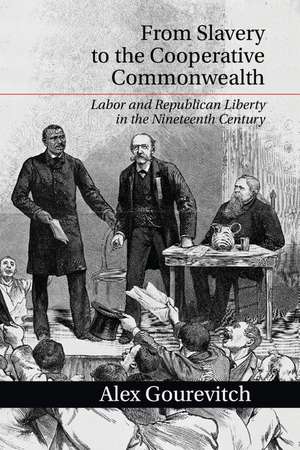From Slavery to the Cooperative Commonwealth: Labor and Republican Liberty in the Nineteenth Century
Autor Alex Gourevitchen Limba Engleză Paperback – 7 dec 2014
| Toate formatele și edițiile | Preț | Express |
|---|---|---|
| Paperback (1) | 202.52 lei 43-57 zile | |
| Cambridge University Press – 7 dec 2014 | 202.52 lei 43-57 zile | |
| Hardback (1) | 556.76 lei 43-57 zile | |
| Cambridge University Press – 7 dec 2014 | 556.76 lei 43-57 zile |
Preț: 202.52 lei
Nou
Puncte Express: 304
Preț estimativ în valută:
38.75€ • 40.57$ • 32.06£
38.75€ • 40.57$ • 32.06£
Carte tipărită la comandă
Livrare economică 07-21 aprilie
Preluare comenzi: 021 569.72.76
Specificații
ISBN-13: 9781107663657
ISBN-10: 1107663652
Pagini: 220
Dimensiuni: 151 x 228 x 15 mm
Greutate: 0.34 kg
Editura: Cambridge University Press
Colecția Cambridge University Press
Locul publicării:New York, United States
ISBN-10: 1107663652
Pagini: 220
Dimensiuni: 151 x 228 x 15 mm
Greutate: 0.34 kg
Editura: Cambridge University Press
Colecția Cambridge University Press
Locul publicării:New York, United States
Cuprins
Introduction: something of slavery still remains; 1. The paradox of slavery and freedom; 2. 'Independent laborers by voluntary contract': the laissez-faire republican turn; 3. 'The sword of want': free labor against wage labor; 4. Labor republicanism and the cooperative commonwealth; 5. Solidarity and selfishness: the political theory of the dependent classes; Conclusion: the freedom yet to come.
Recenzii
'Alex Gourevitch's new book powerfully challenges received understandings of the relationship between liberal and republican ideas and unsettles familiar narratives about the history of American political thought. He shows that republican political theory is not as automatically or easily egalitarian as has often been assumed; that nineteenth-century laissez-faire free labor doctrines themselves made civic and not only liberal claims; and, most importantly and centrally, that those he identifies as 'labor republicans' offered a neglected, fascinating, and distinctively American critique of capitalism and wage labor. From Slavery to the Cooperative Commonwealth is an exciting and highly original work.' Jacob T. Levy, Tomlinson Professor of Political Theory, McGill University
'This is a mind-opening study of an American movement in which the republican idea of freedom was invoked in support of workers. It reminds us that, traditionally understood, freedom argues not just for an open market and a transparent state, but for employment and workplace conditions that guard against servitude and servility. The book makes for salutary reading in an age of 'business-friendly' government.' Philip Pettit, L. S. Rockefeller University Professor of Politics and Human Values, Princeton University, and Distinguished Professor of Philosophy, Australian National University
'Every once in a rare while, a book comes along with an argument that, once advanced, not only changes how we think but makes you wonder how we ever could have thought anything else. Alex Gourevitch has written such a book … The transformative insight at the heart of [this] book is that in the nineteenth century, in the United States, slavery was not a rhetoric but a reality, which drove some of the most breathtaking innovations in how republicans thought about freedom. And once slavery was abolished, its successor - wage slavery, as it was called - drove even more innovations. What emerges from Gourevitch's treatment is a wholesale reconsideration of the republican tradition, in an utterly novel setting … Once we've read this book and digested its implications, we'll never talk about freedom, republicanism, or domination - not just in the past but in the present - in the same way.' Corey Robin, Brooklyn College and the CUNY Graduate Center
'Provides a careful examination of labor arguments, uncovering the complex ways advocates 'embraced and recast' republican ideology.' Daniel J. McInerney, The Journal of American History
'This is a mind-opening study of an American movement in which the republican idea of freedom was invoked in support of workers. It reminds us that, traditionally understood, freedom argues not just for an open market and a transparent state, but for employment and workplace conditions that guard against servitude and servility. The book makes for salutary reading in an age of 'business-friendly' government.' Philip Pettit, L. S. Rockefeller University Professor of Politics and Human Values, Princeton University, and Distinguished Professor of Philosophy, Australian National University
'Every once in a rare while, a book comes along with an argument that, once advanced, not only changes how we think but makes you wonder how we ever could have thought anything else. Alex Gourevitch has written such a book … The transformative insight at the heart of [this] book is that in the nineteenth century, in the United States, slavery was not a rhetoric but a reality, which drove some of the most breathtaking innovations in how republicans thought about freedom. And once slavery was abolished, its successor - wage slavery, as it was called - drove even more innovations. What emerges from Gourevitch's treatment is a wholesale reconsideration of the republican tradition, in an utterly novel setting … Once we've read this book and digested its implications, we'll never talk about freedom, republicanism, or domination - not just in the past but in the present - in the same way.' Corey Robin, Brooklyn College and the CUNY Graduate Center
'Provides a careful examination of labor arguments, uncovering the complex ways advocates 'embraced and recast' republican ideology.' Daniel J. McInerney, The Journal of American History
Notă biografică
Descriere
This book reconstructs how a group of nineteenth-century labor reformers appropriated and radicalized the republican tradition.


















